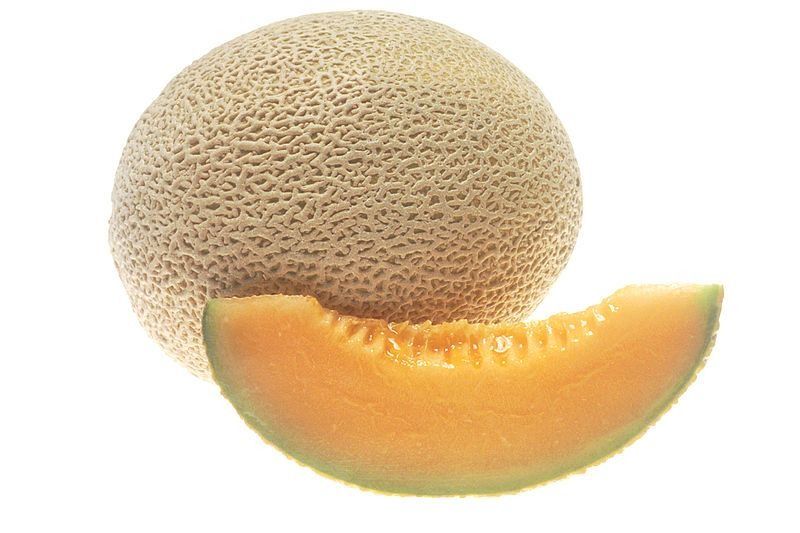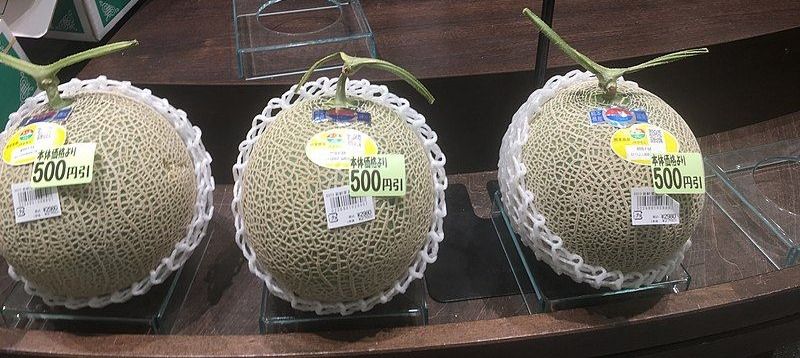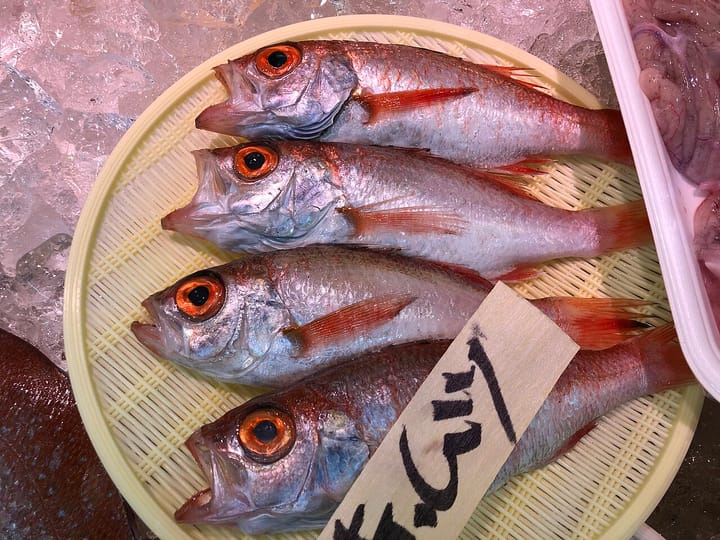Yubari King Melon: The World's Most Expensive Fruit
Japan has a penchant for perfection, and nowhere is this more evident than in its prized Yubari King melon. You might be wondering, what's so special about a melon? Let's dive in.

Amidst the challenges of rising inflation on our grocery shopping, spotting a fruit in supermarkets with a $200 price tag is a rarity. Yet, in Japan, such a phenomenon exists in the form of the Yubari King melon.
This isn't merely a piece of fruit but a testament to luxury, prestige, and perfection. Its unmatched sweetness, flawless shape, and texture set it apart.
Imagine encountering a fruit that rivals your monthly rent! The Yubari King doesn't just demand a high price; it embodies an unparalleled standard in the fruit world.
What is Yubari King Melon?
The Yubari King melon, known in Japanese as 夕張メロン (Yūbari Meron), is a prized cantaloupe variety cultivated primarily in greenhouses of Yūbari, a quaint city near Sapporo in Hokkaido.
Originating from a cross between the Earl's Favourite and Burpee's "Spicy" Cantaloupe, its scientific designation is Cucumis melo L. var. reticulatus Naud. cv. Yubari King.
Aesthetically, the most valued Yubari King melons are distinguished by their impeccable roundness and flawlessly smooth exterior.
They often feature a small piece of stem, carefully clipped for visual appeal. In Japanese tradition, these esteemed melons are sometimes offered as cherished gifts during the Chūgen (中元) festival.
The Birthplace of the Yubari King
In the core of Hokkaido, Japan, the city of Yubari stands as a testament to nature's bounty and human resilience. Favored by volcanic soil and a distinctive climate, Yubari is the sole cultivator of the renowned Yubari King melon.
Much like prestigious wines are linked to their specific vineyards, this exquisite melon owes its perfection to Yubari's unique environment.
Farmers in this region hold immense pride, aware that they're cultivating a prized melons of Japanese produce.
However, Yubari's past isn't as sweet. Once a bustling coal-mining center, its mines' closure in '90s led to a dramatic population drop.
The early 2000s intensified this exodus due to a severe financial crisis. Despite housing one of the world's most expensive fruits, 90% of its residents relocated.
The sales and auctions of these melons bring substantial revenue, bolstering the city's economy. It's a fruit that doesn't just delight the taste buds but also brings prosperity to its birthplace.
How Expensive is Yubari King Melon?

The cost of a Yubari Melon varies based on its grade. The crème de la crème of Yubari Melons, boasting a sugar level within 15-18°Bx Brix reading, are exceptionally sweet and a rarity. Such high-caliber melons can fetch prices nearing $300 each.
Following closely are the melons with a sugar concentration of around 12%, esteemed for their smooth texture and prominent netting, often chosen as premium gifts.
These are priced about $35 each. Meanwhile, those with a sugar threshold of 11% are also popular gifts and perfect for household consumption.
For more budget-friendly options, melons holding a 10% sugar content are available for just above $25.
However, for those curious about the zenith of Yubari Melon prices, a record-breaking moment occurred in 2019 when two Yubari King Melons were auctioned for a staggering $45,000.
Why So Expensive? Breaking Down the Cost
A Price of Japan's Limited Farming Landscape
The premium cost of the Yubari Melon might raise eyebrows, but it's essential to consider the complexities of Japanese agriculture.
With a mere 12% of its territory fit for farming, Japan stands in contrast to nations like the U.S., where 45% is arable.
Faced with such limitations, Japan focuses on essentials, yielding 98% of its rice and 76% of its vegetables locally, while only producing 30% of its fruit needs.
Meticulously Crafted Artwork
Growing a Yubari King is an art form. You see, farmers don't just plant the seeds and wait.
They carefully pollinate them by hand, ensuring that each melon receives the right amount of attention and grown with utmost care.
Each melon takes 100 days to mature, and during this time, farmers use a mix of science and tradition to ensure their growth.
These melons enjoy special raised beds, exact water measurements, and a climate-controlled setting with both heat and cooling.
Once they start to show their unique webbed look, farmers, wearing clean white gloves, gently polish each one.
Did you know that to achieve that perfect round shape and tastiest melons, farmers prune off the other fruits, allowing only one melon to grow per plant?
It ensures that the plant's entire energy is channeled into growing one perfect melon.
These top-tier melons are cleaned daily, and as they grow, each melon is given a little paper hat to shield them from the sun and help them ripen.
The Gifting Culture as Symbol of Prestige
In Japan, gifting is an intricate ritual, imbued with respect and thoughtfulness. If you've been gifted a Yubari King melon, know that it's a huge honor.
Fruits have a special cultural significance. They're not just food; they're luxury items often given as gifts. So, when people buy fruits, they prefer the ones that look perfect since they're paying a premium.
This mindset explains why some fruits can be really expensive in Japan. Think $10 for a single white strawberry, $95 for a square-shaped Zentsuji Watermelon, or even up to $4,000 for a bunch of Ruby Roman grapes or a single Bijin-hime strawberry.
When you see these prices, the other fruits might not seem that expensive after all.
Exquisite Presentation
Each fuji graded Yubari King melon is elegantly encased in individual boxes, often crafted from wood rather than typical paper or cardboard.
Nestled on a bed of hay or silk, and adorned with a ribbon, the emphasis on presentation reflects the importance of aesthetics for such premium items.
To elevate the purchasing experience, many stores include a detailed brochure, reminiscent of fine wine descriptions, highlighting the melon's aroma, sweetness, and finish, ensuring buyers know the exquisite taste they're about to savor.
The Auctions: Battle for the Best
A unique Japanese tradition places enormous value on the initial produce of the early season.
In Sapporo City, Hokkaido, the first Yubari melons to hit the auction block can garner astonishing five-figure bids.
In 2019, two Yubari King Melons sold for an astounding $45,000, $23,550 on 2022, and another pair fetched $25,000 at a festive 2023 market event.
It's a grand event, with over 2,000 melons typically on the auction block where bidders compete fiercely, often paying astronomical sums.
It's a moment of pride for the farmers, watching their nurtured melons become the center of attention.
Beyond the prestige of securing these top-tier fruits, successful bidders also leverage their purchases for promotional gains.
Grading the Yubari King Melon
After being harvested, Yubari King melons undergo a grading system. Melons with imperfections receive the "yuki" grade, the lowest designation.
The top-tier classifications – "fuji," "yama," and "shiro" – are determined by the sweetness and the melon's overall perfection. Remarkably, only 1 in every 1,000 melons achieves the elite "fuji" status.
The Yūbari melon's premium price can be attributed to its meticulous selection process.
Expert inspectors, often the growers themselves, use tactile methods like tapping and flicking to identify a melon's sound quality and inhale its aroma for that distinctive sweet scent.
Beyond these sensory checks, the melon must meet strict criteria: it should weigh between 1.0 to 2.5 kg and possess a gentle oval form. The hallmark of a true Yūbari King Melon is its intricate, uniform netting pattern on the rind, evoking fine lace.
The inside reveals an orange, lusciously soft flesh that's not just juicy but also rich in sugar content. Only melons that align with these exacting standards are honored with the prestigious Yūbari label.
How to Savor a Yubari Melon and What Does It Taste Like?
The Yubari King melon delivers a burst of unparalleled sweetness, reminiscent of honeyed cantaloupe with tropical undertones.
Its vibrant orange flesh is juicy and tender, leaving a lingering, caramel-like aftertaste that epitomizes a gourmet delight.
To properly enjoy the melon, simply slice the melon down the middle, remove the seeds, and relish its flavor.
While the Yubari Melon is delectable on its own, pairing it with other fruits or gourmet sweets can elevate your dessert experience to opulent heights.
Interestingly, taste-wise, there's negligible difference between a $300 melon and its $10,000 counterpart.
When is the Season?
From May to August, Yubari Melons reach their peak harvest season. During these months, the Yubari region buzzes with festivities, including the notable Yubari Melon Festival in June, which showcases a lively melon auction and a popular eating contest.
The Yubari King's Ancestry
The Yubari King melon didn't just appear overnight. Its lineage traces back to two types of cantaloupes that were crossbred during the 1960s.
Over the years, through meticulous cultivation and a dedication to perfection, what started as an experiment blossomed into the superstar fruit that is revered today.
The Verdict: Is It Worth It?
It's easy to dismiss the Yubari King melon as just another overpriced luxury. But to truly understand its value, one needs to experience the dedication that goes into growing it, the honor associated with gifting it, and the unparalleled taste it offers.
It's not just a melon; it's a symbol of Japanese culture, precision, and luxury.
For those who can afford it, the experience of tasting a perfectly ripe Yubari King melon is one for the books. For the rest of us, it remains a tantalizing dream, a testament to the lengths humanity will go in the pursuit of perfection.


